|
|
Special Report: COLOMBIAN PEACE PROCESS AND THE CDM The Clean Development Mechanism might become an unlikely building block in Colombia’s peace process if a fascinating proposal from that country’s National Industrial Association (ANDI) is taken up. Juan Pablo Bonilla (ANDI, jbonilla@andi.com.co) talked to Peter Doran about a tentative proposal to generate CDM credits in the Colombian Amazon through the development of sinks while helping to displace illegal crops which provide cash for insurgents and drug cartels. |
 Left: Peter Doran, Earth Negotiations Bulletin, interviewing Juan Pablo
Bonilla, Colombia
Left: Peter Doran, Earth Negotiations Bulletin, interviewing Juan Pablo
Bonilla, Colombia
![]() Real
Audio interview with Juan Pablo Bonilla, National Industrial Association, Colombia
Real
Audio interview with Juan Pablo Bonilla, National Industrial Association, Colombia
SPECIAL EVENTS ON THE CDM
Clean Development Mechanism and a road map to certification
At this event, a paper - Project Certification under the CDM: Some Technical and Institutional Issues - was presented and discussed. Written by Eveline Trines of the Societe General de Surveillance (SGS), the paper aims to clarify and elaborate on some of the concepts outlined in Article 12 of the Kyoto Protocol, including project eligibility and criteria, certification issues, and institutional arrangements. It argues that further clarification is needed in several key areas in order for the CDM to function effectively.
The meeting was arranged by the World Business Council for Sustainable Development (WBCSD, http://www.wbcsd.ch) in collaboration with the SGS. Christopher Upton (WBCSD) and Eveline Trines (SGS, etrines@sgsgroup.com) hosted the event.RIght: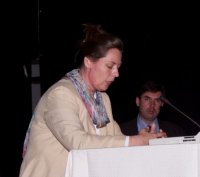 Eveline Trines, Programme Manager,
Carbon Offset Verification, Société Générale de Surveillance (SGS) presenting her
report on Project Certification under the Clean Development Mechanism, and
Christopher Upton, World Business Council for Sustainable Development (WBCSD),
www.wbcsd.ch
Eveline Trines, Programme Manager,
Carbon Offset Verification, Société Générale de Surveillance (SGS) presenting her
report on Project Certification under the Clean Development Mechanism, and
Christopher Upton, World Business Council for Sustainable Development (WBCSD),
www.wbcsd.ch
![]() Eveline Trines discusses her paper and the aims of the meeting
Eveline Trines discusses her paper and the aims of the meeting
The Clean Development Mechanism - issues and options Erik Haites
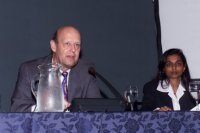 (Margaree Consultant, Inc., pictured left) and Farhana Yamin (FIELD)
presented a paper entitled The CDM: Proposals for its Operation and Governance.
The aim of the paper was to identify the key issues that need to be addressed in designing
the operation and governance of the CDM. The authors concluded that the success of the CDM
will depend on the pragmatism of policy makers and the private sector. The event was organized
by the UNFCCC.
Other panelists involved in the meeting included
Tahar Hadj-Sadok (UNFCCC), Professor Jose Goldemberg (University of Sao Paolo) and Vanida
Govender (Corporate Environmental Affairs Manager, Attorney of the High Court, South
Africa).
(Margaree Consultant, Inc., pictured left) and Farhana Yamin (FIELD)
presented a paper entitled The CDM: Proposals for its Operation and Governance.
The aim of the paper was to identify the key issues that need to be addressed in designing
the operation and governance of the CDM. The authors concluded that the success of the CDM
will depend on the pragmatism of policy makers and the private sector. The event was organized
by the UNFCCC.
Other panelists involved in the meeting included
Tahar Hadj-Sadok (UNFCCC), Professor Jose Goldemberg (University of Sao Paolo) and Vanida
Govender (Corporate Environmental Affairs Manager, Attorney of the High Court, South
Africa).
Erik Haites discusses the paper he co-wrote, as well as some of the issues raised at the meeting.
Press Briefing: Climate Change and Human Health This event, arranged by WWF and the Fundacion Vida Silvestre Argentina, saw the release of a report from WWF dealing with climate change and human health. The report was written by Dr Paul Epstein, who is an Associate Director at Harvard Medical School. It warns of the serious consequences global warming may have for the future control of disease. Speakers included the author of the report, Dr Paul Epstein, as well as Dr Alfredo Seijo from Hospital Muniz in Buenos Aires.
Andrew Kerr (WWF) opens the meeting and outlines the key issues.
 Web site:
http://www.panda.org/climate and http://www.wwf.org/ Web site:
http://www.panda.org/climate and http://www.wwf.org/Right: Andrew Kerr, WWF, and Mark Kenbar , WWF International, at the WWF press conference |
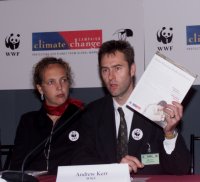 Jennifer Morgan, Climate Policy Officer, WWF, seated with Andrew Kerr, WWF, who
presented the WWF report on Climate Change and Human Health
Jennifer Morgan, Climate Policy Officer, WWF, seated with Andrew Kerr, WWF, who
presented the WWF report on Climate Change and Human Health |
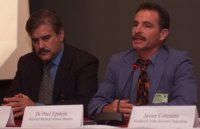 Dr. Alfredo Sejo,
Hospital Muñoz, Buenos Aires, and Dr. Paul Epstein, Associate Director at Harvard
Medical School and author of the Climate Change and Human Health report Dr. Alfredo Sejo,
Hospital Muñoz, Buenos Aires, and Dr. Paul Epstein, Associate Director at Harvard
Medical School and author of the Climate Change and Human Health report |
The Brazilian Proposal and other Options for International Burden Sharing
The aim of the meeting was to present a discussion paper by Marcel Berk (Marcel.Berk@rivm.nl, 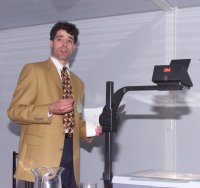 pictured right) and Michel den Elzen (Michel.den.Elzen@rivm.nl) from the Netherlands
National Institute for Public Health and the Environment (RIVM).
pictured right) and Michel den Elzen (Michel.den.Elzen@rivm.nl) from the Netherlands
National Institute for Public Health and the Environment (RIVM).
The paper they presented, entitled The Brazilian Proposal and other Options for International Burden Sharing, assessed the methodology used in the original Brazilian proposal. It concluded that the methodology is incorrect, and that it overestimates the contribution of the Annex I countries to temperature increase while underestimating that of non-Annex I states. It also examined how the burden of emissions reduction could be allocated, assessing various options using a new model the authors have developed.
In this real audio interview, Michel den Elzen outlines the key issues covered in their paper.
Designing a framework for international cooperation: will the flexible mechanisms meet our common objectives? The meeting was hosted by the Institute for Global Environmental Strategies (IGES, http://www.iges.or.jp/), an international research organisation involved in policy oriented research. IGES was established in April this year with support from the Government of Japan. Part I of the event debated the issue of forging an international cooperative framework based on mutual trust, while Part II examined specific proposals for Emissions Trading, Jointe Implementation and the Clean Development Mechanism.
Speakers included several representatives of IGES, as well as Hiroshi Ohki, the Chairperson of COP3, and Kazuo Aichi, a Member of the House of Representatives in Japan, as well as a former Minister of the Environment Agency.
Below: Responding to questions, 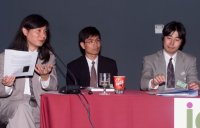 Dr. Jiro Akita, Tohoku University, Japan, Dr. Naoki Matsuo, IGES, and
Tatsuyoshi Saijo, Osaka University, Japan , higlight the benefits of emissions trading
and the inclusion of the clean development mechanism as one of the flexibility mechanisms
Dr. Jiro Akita, Tohoku University, Japan, Dr. Naoki Matsuo, IGES, and
Tatsuyoshi Saijo, Osaka University, Japan , higlight the benefits of emissions trading
and the inclusion of the clean development mechanism as one of the flexibility mechanisms
In this real audio interview Professor Akio Morishima, Chair of the Board of Directors of IGES, talks about the organisation's work and the event itself. Following is Naoki Matsuo, Ph.D. - also of IGES -
discussing flexibility mechanisms and EU proposals to limit the tradeable amounts of emissions.
Right: Prof. Akio Morishima, Chair of the Board, IGES, and Hiroshi Ohki, COP-3 Chair and former Minister of Environment Agency, Japan, during the IGES special event
Miscellaneous photos
 Left: Left: 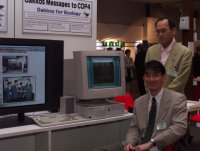 Members of the Korean
Ecological Youth (KEY) group from South Korea read messages to COP-4 participants
collected from children around the world. The messages express the children's concerns
regarding the environment and are posted on the Gakkos web site and on the Gakkos tree
prepared for COP-4. Members of the Korean
Ecological Youth (KEY) group from South Korea read messages to COP-4 participants
collected from children around the world. The messages express the children's concerns
regarding the environment and are posted on the Gakkos web site and on the Gakkos tree
prepared for COP-4.
|
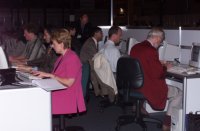 Left: Conference participants catch up on email at one of the two
computer centers throughout the conference hall Left: Conference participants catch up on email at one of the two
computer centers throughout the conference hall
|
Return to ENB COP-4 home
© Earth Negotiations Bulletin, 1998. All rights reserved.


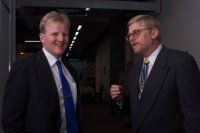 Right: Paul Clements-Hunt, Policy
Manager, International Chamber of Commerce, and Langston James Goree IV
Right: Paul Clements-Hunt, Policy
Manager, International Chamber of Commerce, and Langston James Goree IV